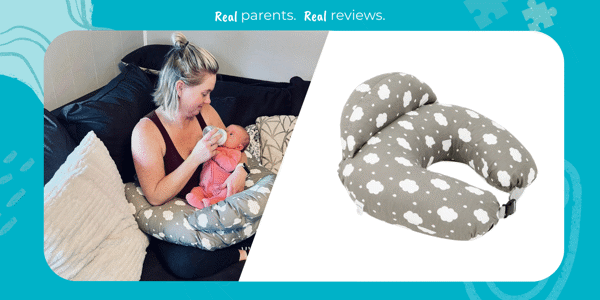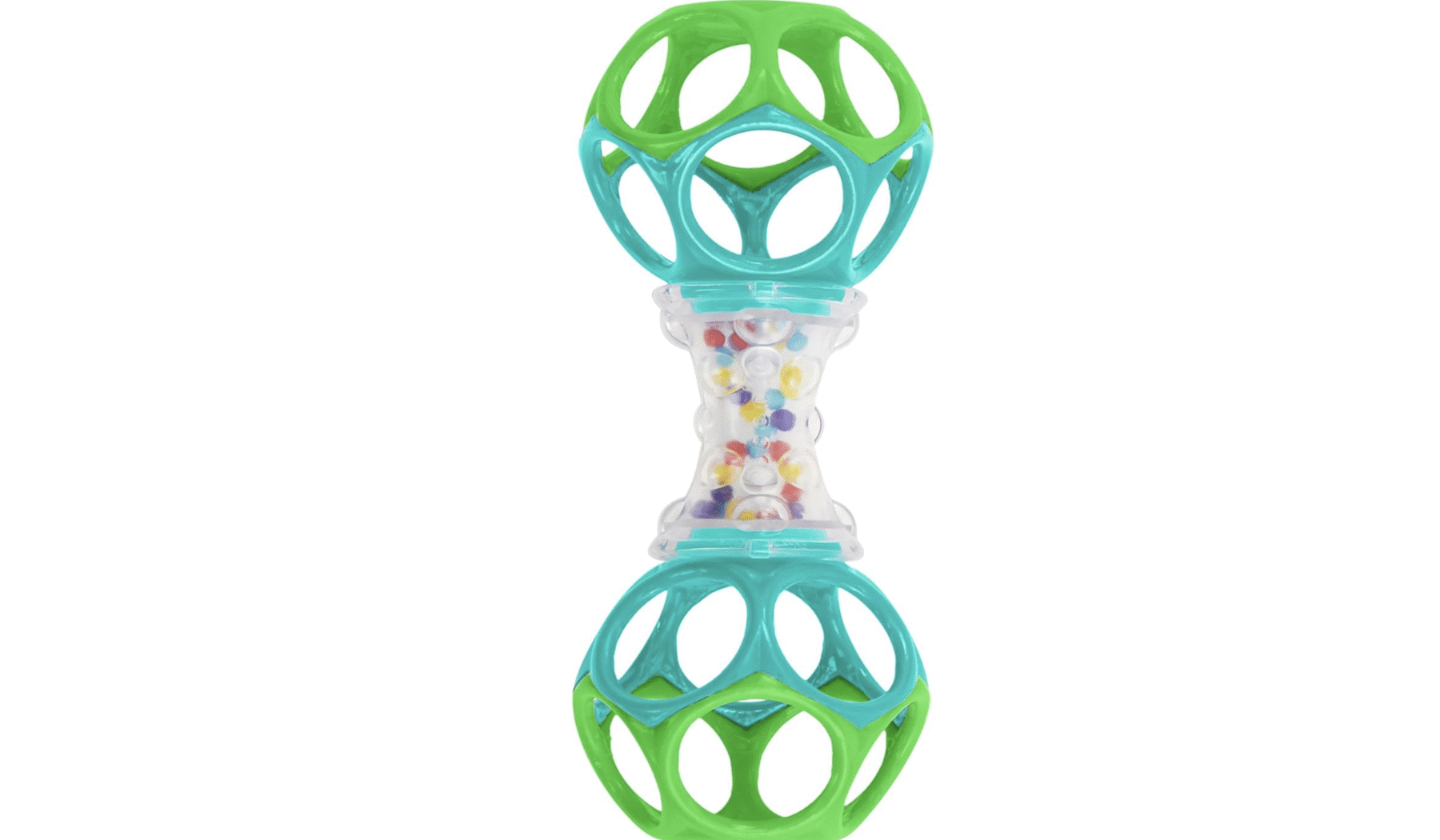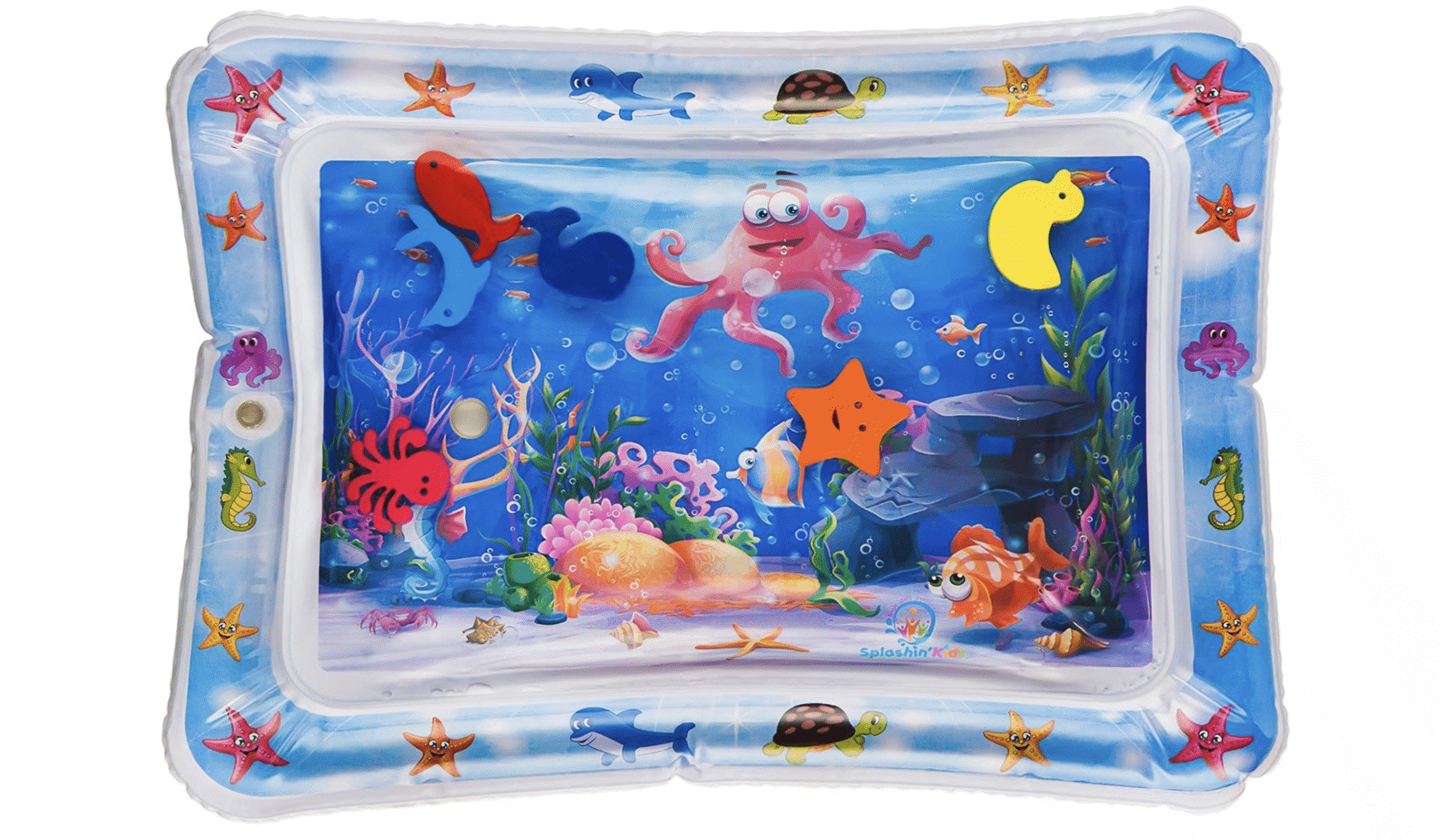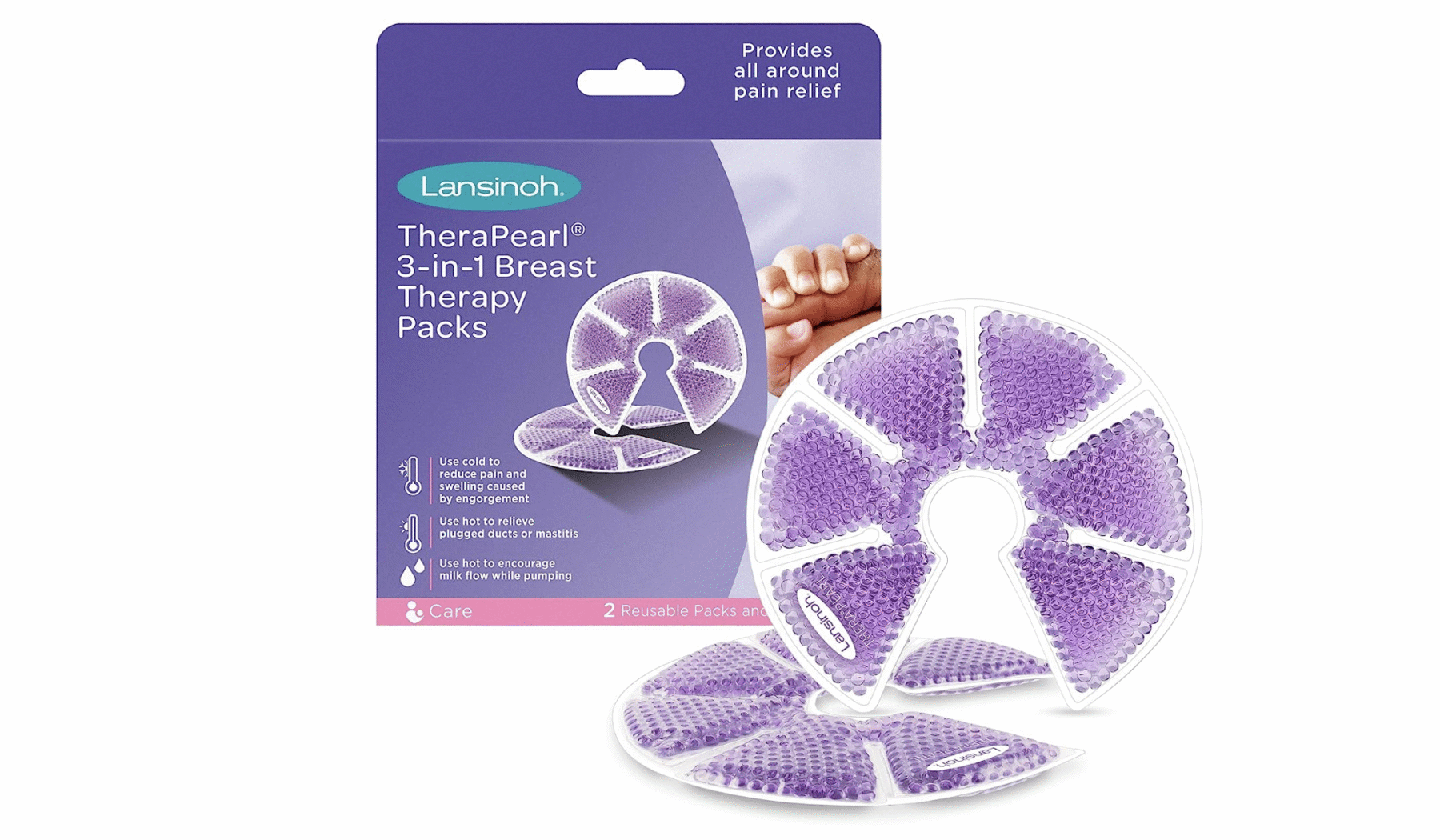Your baby is becoming an infant, leaving the newborn stage in the past. Luckily, this means that better sleep for both of you is coming! Your baby is becoming more social as the weeks go on and is likely imitating any vowel sound you make to them. Their sleeping patterns are also getting easier to predict. You will begin noticing that your baby is aware of their surroundings and might even recognize objects, voices, sounds, and faces now.
Give your baby lots of attention as they seek ways to engage with you. By this week, about 50 percent of babies clearly recognize their parents, and they may even look for you in a room full of people.
Your baby is developing new skills like grasping their toys and even wrapping their little hands around your fingers. Although their movements may not be precise, they are practicing and improving rapidly! This month will be filled with many milestones in your baby's development, and they will begin transitioning to more of a schedule with your assistance.
Your baby's reflexes will rapidly improve as they transition out of the newborn stage and leave their involuntary movements and reflexes behind. Their movements now have a purpose. Your little one’s hand control will strengthen as they practice reaching for things they want. By now, your baby should be a pro at opening and clenching their fists and are likely reaching to grab things from you (like wipes during their diaper changes).
A reason that your baby's reflexes have strengthened is that their hand-eye coordination is developing. As their coordination improves, their preciseness will, too. When your baby sees a toy, they can coordinate their hand motions to reach for it now!
Your baby can most likely raise their chest and neck during tummy time by now. They can support their upper body with their arms and keep their head steady while doing so. Their movements will become less wobbly, and they will have stronger head control. Your baby's torso muscles are also strengthening, allowing more movement! When they are lying down, whether on their back or stomach, they will kick their legs around as they gain strength, too. If you hold your baby upright with their feet on a solid surface, they will likely begin attempting to stand upright.
You might still be struggling with your mental health this week. Overcoming postpartum depression (PPD) is challenging for many new parents, even fathers. This is common for new moms (and dads); you are not alone. If your symptoms have been lingering or worsening over the weeks, contact a doctor or take an online PPD quiz.
If you are experiencing symptoms including mood swings, irritability, crying, or trouble focusing, you can get help! The baby blues are common for new parents and can overwhelm you with emotions. If these feelings worsen or interfere with your daily tasks, you could have postpartum depression, not just baby blues. After having a baby, it is common to experience feelings of anxiety and depression.
If you are or become diagnosed with postpartum depression, there are solutions. Treatment options for postpartum depression include therapy, antidepressants, or both. Do not feel ashamed to ask for help!
Your baby will be thrilled to play with or reach for things, no matter how simple you think they are. You can dangle toys over them or tie them above their bed so they can reach up for them whenever they are lying on their back. An excellent activity for this week is setting up a play area for your baby. Fill the space with new and exciting things.
Objects that grab their attention will tempt them to move their head in different directions. This will help them develop the skills they need to roll over. You can stand up books in their play area or leave them open to pages with bright images, patterns, and colors. Musical toys or anything that moves will also inspire them to turn around and watch from any direction.
Spend time playing with your baby’s fingers and hands. They will spend a lot of time with them in their mouth as they learn to move them. Help them learn to move their fingers around and use the little piggies to make it fun. Any toys with a texture or pattern will inspire them to run their fingers across them, which helps their hand-eye coordination.
Diaper rash is common and, at times, unavoidable. Diaper rash is usually caused by wetness and chafing on the skin near the diaper area. At times, diaper rash can lead to an infection known as dermatitis. If urine or feces is left unchanged for an extensive period of time, bacteria or yeast might even grow in the area. The cure for most cases of diaper rash is dryness and more frequent diaper changes.
If your baby begins developing a diaper rash, try using a diaper rash cream to create a barrier between your baby's skin and the cause of irritation. Creams containing zinc oxide remain on the skin longer and provide more protection.
If diaper rashes persist, try changing the products you use for your baby. Changes you can make to avoid or lessen the chance of diaper rash include switching to fragrance-free diapers, lotions, and other products. Instead of using wipes to clean the area by rubbing and irritating it further, try a squirt bottle with plain warm water to clean the area.
Avoid rubbing, but use cotton balls or a soft cloth if wiping is required for a more thorough clean. Before using any yeast creams or over-the-counter medications for your baby's diaper rash, check with your baby's pediatrician.
Physical touch has an enormous impact on your three-month-old baby! They love being held by you and enjoy the little rubs you give them. Your baby's personality is undoubtedly emerging as they develop. You might notice your baby is excited by new people or new activities, but if they seem shy, that's okay too! They might just be overwhelmed by new people or too many new people at a time. Do not keep them away from things that make them uncomfortable, but continue introducing them to new things slowly. It is also possible that you will notice a change in your baby's eye color now that their vision has developed!
Your baby is continuing to grow stronger each week. Flexibility in their hip and knee joints has increased, making their kicks more powerful! Encourage your baby to reach for toys and objects to help improve their hand-eye coordination.
Babies love physical touch, a critical part of their growth and development. Skin-to-skin contact with your baby will help your bond grow! Simple things like back rubs and cuddles are a powerful way of relaxing your baby. These actions will comfort them when they are upset or overwhelmed.
Not only will your baby benefit from your touch, but they will also learn from what they can touch and feel. Now that they have increased mobility in their fingers, allow them to feel new materials. Introduce your baby to various textures like silk, terrycloth, and fleece! They will love handling these new materials. Consider buying "touch and feel" books to make story time a tactile experience for your baby.
Now that your baby is three months old, their feeding pattern has become more regular. Feedings will still occur frequently, but you can expect fewer erratic feedings from now on. Since your baby is growing and is bigger, they can eat more at a time. If you are breastfeeding, your baby may increase the time between their regular feedings by an hour or two. Pay attention to their hunger cues to learn when they need to be fed.
To avoid clogged ducts or mastitis, try various nursing positions. This will help you avoid irritation and attempt to prevent mastitis. Since your baby is going more extended periods between each feeding, they will be taking larger amounts each meal. Expect your baby to consume 4-6 ounces of either breast milk or formula every 4-5 hours.
Your baby's digestive system is still not ready for solid foods and will not be until they are between 4-6 months old. Despite what you've heard about it helping them sleep longer, do not add any baby cereal to her bottle. No evidence shows this will help them; it only poses choking hazards.
Your baby is likely falling into a regular sleeping routine by now. They will likely nap three times a day and go to sleep at a similar time each night. Follow your baby's sleep cues and encourage a schedule! Between their naps and night sleep, your baby will spend around 16 hours asleep each day.
The hours will likely be broken up into 6 hours of napping between 3 naps and 10 hours at night. Although they probably won't sleep ten straight hours through the night, sticking to a routine will help them become capable of doing so.
Now that you have carried your baby for nine months and given birth, your body is going to look different even though three months have passed. It is common for your hips and waist to be wider than they were before and for your stomach to be softer than it was pre-pregnancy. Allow time for your body to adjust and recover.
If you are breastfeeding, keep in mind that your body is still changing! Remember that although it has been three months since you gave birth, your body was growing for nine! Don't restrict yourself or set a timeline for yourself, especially if you are breastfeeding.We know that physical touch greatly impacts your baby at this stage, so why not keep them entertained with things that they can touch, feel, and learn from? Help your baby strengthen their senses with touch-and-feel books!
Sensory books make reading time more enjoyable for your baby and will help them develop a love for books. These books help engage multiple senses at once, including sight, sound, and touch. When reading touch-and-feel books to your baby, their motor and language skills will improve simultaneously!
Other activities that include physical touch are blowing raspberries. Doing this is sure to get your baby giggling. When you press your lips against your baby's skin and blow, a silly sound is produced, which might even encourage your baby to create sounds of their own. By blowing raspberries and encouraging your baby to experiment with sounds, you are helping them build communication skills in a fun and silly way!
Your baby is still receiving vaccinations and attending checkups at this stage. Although many shots are supposed to be received at a specific point in your baby's life, it is important you know that you can postpone these appointments if it is what's best for your baby's health!
Anytime you need to cancel an appointment, your doctor will help you pick up right where you left off. Certain scenarios may arise that require you to reschedule your baby's immunization. Your doctor will always advise you if you should postpone a vaccination or if it is safe to go ahead and get it that day. Still, if your baby has a high fever or a new illness, it is best to reschedule. Your baby should be sleeping for longer stretches at night now, but if they are regressing in progress, that is normal, too. This week, try introducing your baby to new toys like rattles. Rattles make sounds that will inspire your baby to practice grabbing and making sounds of their own. A new milestone to watch for or listen to this week is laughter from your baby.
Laughing is a beautiful way for you and your baby to communicate and grow your bond. Although they will not recognize their reflection, hold them in front of a mirror and let them giggle.
Whether you bounce your baby on your lap or play with their fingers and toes, you are likely providing them with plenty of skin-to-skin contact. This is great for their emotional development. Begin to encourage your baby to roll over. Most babies master this skill between months four and six, so they might perfect this skill, but you can try propping them up or letting them sit upright in their stroller to help strengthen their neck and torso for when they are ready to reach this milestone. Sitting upright in their stroller will allow your baby to observe and learn from their surroundings.
Between three and six months, drooling is at its peak. Although most babies' teeth will not break through the skin until months four through seven, they begin drooling ahead of time. This stage is often messy due to the lack of control over their lips and tongues. Keep bibs around to help your sanity and avoid absurd amounts of outfit changes throughout the day.
Bibs will sop up the wetness from your baby's drool so that their shirt does not become soaked in saliva. Consistent drooling may lead to a rash developing on your baby's face, but applying lotion or petroleum jelly to the area will create a barrier between your baby's skin and the saliva.
If you see white spots inside your baby's lips and cheeks or on his gums, it could be a sign of thrush. Thrush is a fungal infection in or on your baby's mouth that occurs when a type of yeast called Candida Albicans grows in their mouth. Since babies do not yet have fully formed immune systems, it is hard to control the bacteria and germs in their bodies.
If you breastfeed, your nipple may also become infected with yeast, which can travel through your baby's digestive system, resulting in a yeast infection on their bottom. If your baby develops thrush, their doctor will likely prescribe an anti-fungal medication for both of you. This will prevent the two of you from reinfecting each other repeatedly. Once treatment begins, the infection could take several weeks to go away entirely. Keep your baby's toys sanitized by sterilizing them in boiling water.
It is common for your baby's sleeping habits to regress at this stage. It seems like you were just getting the hang of your nighttime routine, and now it is being disrupted. This is normal; do not get frustrated.
Your baby's naps might be getting shorter, and feeding time might result in fussiness, but making adjustments is crucial now. As your baby's brain matures, their sleep cycles do, too, and they become more like ours. Your baby will start moving in and out of light and deep sleep cycles, which is new to them.
Since your baby is unfamiliar with different sleeping cycles, falling back asleep after waking up mid-sleep cycle will likely be a challenge for them. Try to stick to a similar schedule for when you put your baby to bed each night. It will take a week or two to get through this sleep regression, but adding a late-night feed to your routine could benefit your little one.
Whenever your baby struggles with sleeping at night, you do, too. You are likely physically and emotionally exhausted during this stage. Caring for a baby is challenging; you both learn a lot during the first few months. Your body and mind have been working nonstop to care for and provide for your little one.
This can take a toll on you, and there is no definite timeline for when you will feel like yourself again. You can make this period easier on yourself in ways as simple as practicing healthy habits.
Eating right will help your mood and energy stay stable. Grabbing a handful of chips is far easier than washing, drying, and cutting up produce, which is why meal prepping could be beneficial to you! Your body needs healthy fats and protein to fulfill cravings. Stocking your fridge with pre-sliced apples with nut butter for dipping, hard-boiled eggs, hummus, and pre-cut veggies allows for easy grab-and-go snacks! Keeping trail mix around can help combat those salty and sweet cravings.
These are all great snacks that will actually keep you satisfied. Pre-cut veggies are a great option to keep in the fridge for snacking because, at the end of the week, you can toss what's left into a salad instead of throwing them out!
Having a new baby for the first time is a huge change. Everything about your life changes once you become a parent. You have different priorities, cares, worries, and schedules now. Being a parent changes your relationships with friends, activities, and habits. Your friends who are not parents yet will likely be delighted to play with your new baby and get to know him.
As excited as they may be for this new chapter of your life, they might also be jealous or sad about how drastically your day-to-day schedule has been altered.
You cannot expect life to go back to how it was pre-pregnancy, and your friends cannot, either. Practice finding a balance between how your life and friendships used to look and how they look now with your new responsibilities as a parent. You can't abandon your baby, but you also should not abandon your friendships. If you can, try to spend alone time with your friends.
If you are struggling during this time, do not worry. Playgrounds and support groups can be a place where you and your baby both get to make new friendships and find people with whom you have common interests. Inevitably, you will soon make new friendships alongside your baby, and these people may have more similarities to you than you expect; after all, you are both parents of babies the same age!
Continue repeating sounds back to your baby this week. You are approaching the fifth month of your baby's life, and they are getting the hang of "conversing" with you through babbles. All babies reach milestones at different times, so do not be concerned if your baby is not as advanced as others their age.
If you are concerned, their pediatrician will answer any questions you have and reassure you that your baby is developing at their own rate. Keep encouraging them to roll over if they have yet to conquer the skill. Help them feel comfortable in new environments by exposing them to different settings and introducing them to people.
As a new parent to a baby, many scenarios are unavoidable. Your baby will likely come down with an illness at least a few times before their first birthday, but you can learn how to act on it and treat it if you cannot avoid it. Daycares and playgroups are sanitized daily, but the other children in attendance may bring germs into the environment.
Unlike you, your baby does not quite have a high tolerance to these germs, which can result in infections and viruses. Instead of keeping your baby away from fun experiences entirely, learn how to react to these scenarios that are likely to occur more than once.
Otitis media, commonly known as an ear infection, occurs when viruses, bacteria, and fluid get trapped behind the eardrum. Since babies spend a lot of time horizontally or lying down, they are very prone to ear infections, and many babies will experience one by their first birthday.
The infection is followed by swelling and pain in your baby's ear and, in some cases, a fever. Pay attention to any symptoms your baby presents, including lack of appetite, tugging on or fussing with the ear, or a fever.
Your baby will likely refuse to eat when experiencing an ear infection since it makes chewing and swallowing painful. The pressure in your baby's ear can be painful for them and may result in irritability.
The pain from the pressure worsens when they are horizontal, which also affects their appetite. If you are breastfeeding, you likely hold them horizontally while they feed. Between this position and swallowing, eating can be painful for them. Try holding them a different way and see if they will swallow.
Ear drainage is another symptom your baby might present, along with diarrhea. This is because the virus that causes ear infections also affects your baby's digestive system. If the infection does not go away independently, your baby's doctor may prescribe an antibiotic.
This will prevent the condition from worsening and alleviate pain, giving your baby quicker comfort. After starting the medication, your baby's fever should fade. Still, their pediatrician may recommend acetaminophen to relieve any pain from the fever.
Ear infections are common for babies, and 50 percent will experience one in their first year. Still, there are ways to limit the likeliness of them occurring. Keep your baby away from things that will weaken their immune system, such as smoke, tobacco, and large daycares. Daycares are filled with germs that live there or are brought in by kids.
Smaller daycares with fewer children will reduce your baby's exposure to germs. Some studies show that limiting your baby's pacifier use and strictly breastfeeding will lessen the likelihood of ear infections occurring. Lastly, pheromonal and flu shots have also been shown to reduce the likelihood of ear infections.
Your body and diet are evolving along with your baby's each week. If you breastfeed, your diet has likely changed several times within the past few months, depending on your baby. What you eat affects your breast milk production and, therefore, your baby. Although you may still be trying to lose baby weight, nursing mothers often need to increase their caloric intake rather than limit it.
Mothers who breastfeed should consume 500 calories more than they did pre-pregnancy or 200 calories more than they did during pregnancy. Producing milk requires your body to consume extra nutrients and calories, not to mention all of the nutrients you lose through your milk. Needing to eat more calories does not translate to daily milkshakes and french fries with lunch; you need nutrient-dense foods during this time!
The extra calories you add to your diet should be nutritious. It is important to consume vitamins A, C, B6, E, and B12, as well as calcium, copper, zinc, folic acid, and riboflavin when breastfeeding since doing so strips you of these vitamins and minerals. Although you can still enjoy a junky treat here and there, try incorporating things like yogurt, eggs, nuts, and vitamins into your diet to reach the additional 500-calorie intake.
The American Academy of Pediatrics recommends starting to work solids into your baby's diet between months four and six. As your baby approaches month four, it is time to introduce them to solid foods slowly. Do not jump into regular foods you consume; your baby is still learning to digest and must start off simple.
Bland solid foods such as iron-fortified rice cereal are common for beginning this process. You can make this for your baby by combining a small amount of powdered cereal with formula or breast milk. Mix the ingredients into a thin paste and dab a small amount onto your baby's lips with a rubber spoon. Let them taste this new flavor and explore it with their tongue. Most of the mixture will likely get pushed out of their mouth since babies have a natural tongue-thrust response.
Continue giving them small spoonfuls of the paste slowly. In a few weeks, you can introduce your baby to more adventurous solid foods such as mashed-up veggies and fruits, but for now, continue this activity with your baby at feeding time. This activity will help your baby get the hang of eating and digesting before they try actual foods.
You can also choose to wait a little longer before introducing solids into your little one's diet if you'd like. There's nothing wrong with waiting a little longer, and many mothers choose to only breastfeed for the first six months. The choice is yours.
Leaving your baby alone with someone new is nerve-wracking. It is normal to feel anxious about leaving your child with a new babysitter or at a daycare for the first time, but this feeling should also reassure you how great of a parent you are!
Trusting your gut when something feels off is essential, but you might be tense and nervous if this is your first time using a childcare service. Don't overwhelm yourself with worries; your baby can sense your energy. A babysitter is sometimes necessary if something comes up, so it is never too early to test a few out. Find out who your baby is comfortable around and feels safe with.
When hiring a new babysitter, ask for recommendations from parents you trust and share similar parenting styles. You can also ask your new sitter for references and get in contact with families they have worked for in the past.
You do not have to dive right in once you find a babysitter that works for your family. You can test how your baby and they interact. Have the potential sitter occupy and entertain your baby while you do house chores first.
This lets you see firsthand how your baby and their sitter interact. Stay calm once you feel comfortable and are ready to leave your baby alone. Do not let your nerves show because your baby will likely pick up on them and be nervous about you leaving.
Begin to develop a quick "goodbye routine" with your baby. This will help avoid fussiness and crying when you leave. Try not to interrupt or put a pause to whatever activity your baby is doing at the time, and leave with a simple kiss on the head. Calling attention to the fact that you are leaving might upset your baby and make leaving a longer and more emotional process for both of you.
Avoid checking in throughout the day, especially if you come back to grab something and leave again. This will also make the situation harder for both of you and confuse your baby.


The information on the Your Baby Club website is not intended to be a substitute for professional medical advice, diagnosis or treatment. Always discuss any health concerns with a qualified healthcare provider and carefully review all guidance that comes with any medications or supplements before taking.









